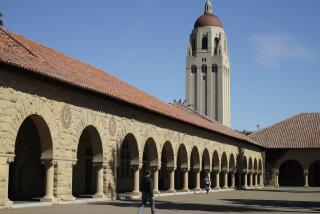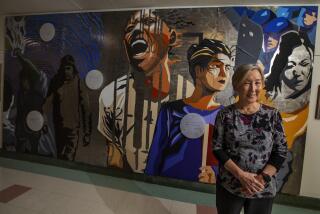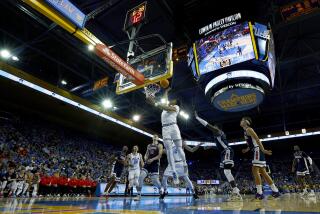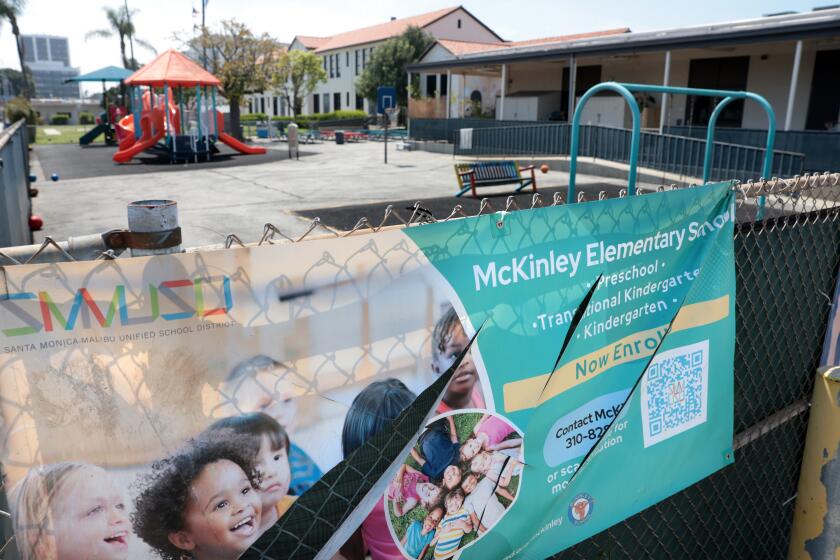With $5.49 billion haul, UCLA rivals private colleges in fundraising — it’s part of a trend
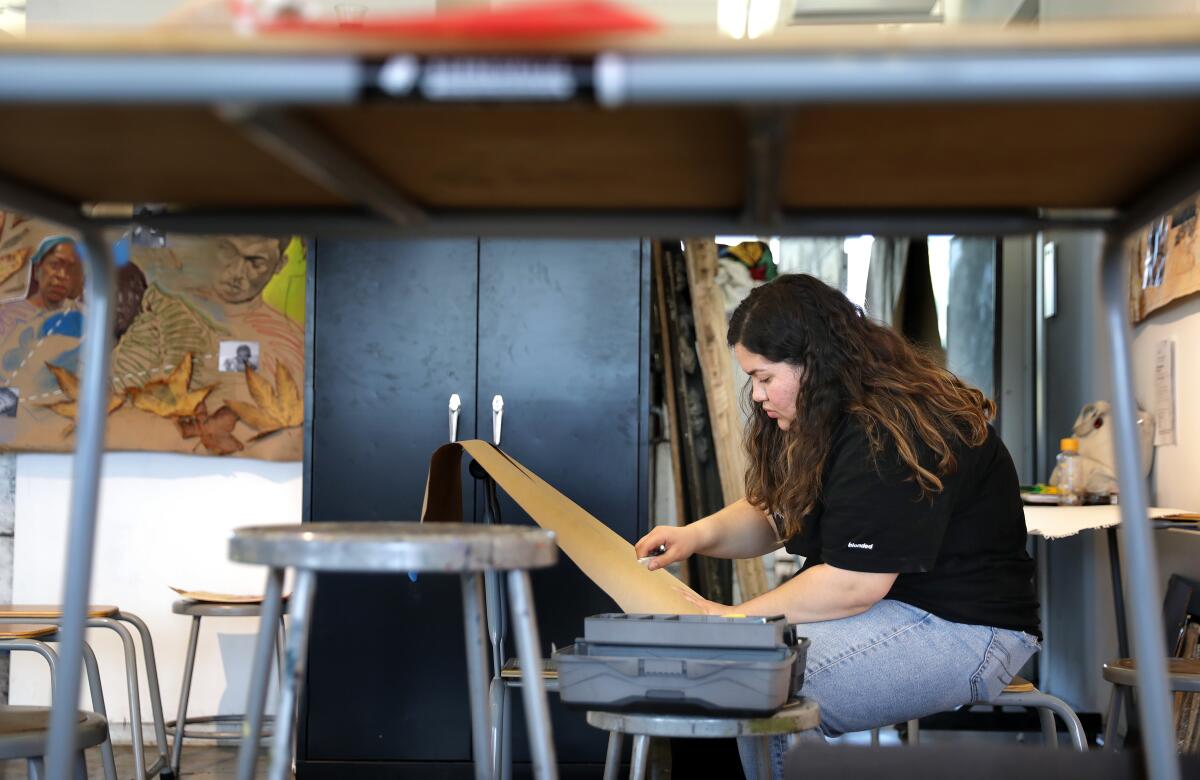
UCLA has raised $5.49 billion in one of the nation’s most successful public university fundraising campaigns, as an “arms race” heats up throughout the country for private philanthropy to offset state funding shortfalls.
The final tally, announced Wednesday by campus officials, surpassed its initial goal by more than $1 billion after its public launch in 2014 to commemorate UCLA’s centennial anniversary this academic year. The funds will help support a range of initiatives at one of the nation’s leading public research universities, including student scholarships and support, endowed faculty chairs, research projects and building needs.
“The primary goal of this effort was to let UCLA’s future eclipse even the greatest achievements of our past,” Chancellor Gene Block said. “This campaign, fueled by so many passionate supporters, provides the foundation we need to move into our second century with confidence.”
The massive campaign reflects a growing national trend as more campuses launch larger and longer fundraising efforts in a scramble to find new sources of revenue for needs that state funding no longer fully supports.
U.S. higher education hit a critical tipping point in 2017, when more than half of all states relied more heavily on tuition dollars to fund their public colleges and universities than on government appropriations for the first time in the nation’s history. At University of California campuses, state support has fallen from 84% of its core budget in 1990 to 42% today.
Four-fifths of 913 public and private colleges and universities recently surveyed were either in a fundraising campaign or about to enter one, according to Linda Durant, vice president of development for the Council for Advancement and Support of Education. More than 50 campuses have launched $1-billion fundraising campaigns. Fourteen have aimed even higher, at $5 billion or more, including five public institutions: UCLA, UC San Francisco, University of Washington, University of Virginia and University of Michigan. USC raised $7 billion in its recent campaign.
“There’s definitely been an uptick,” Durant said. “There used to be a pause between campaigns, and institutions are really no longer doing that.”
Anthony Pritzker, co-chairman of the UCLA fundraising committee, said that to build excellence and a competitive edge the university had to move aggressively because “there’s a bit of an arms race to attract and retain top faculty and researchers.”
Some fear that the growing reliance by public universities on private philanthropy will weaken the case to elected officials for more state funding. Block, however, noted that the vast majority of donations are restricted to donor desires and cannot be used for ongoing operational expenses.
“People don’t generally donate to keep the lights on or keep the physical plant in good shape,” Block said. “Philanthropy is not a substitution for state support.”
Others are concerned that philanthropy can skew institutional priorities to the desires of donors, exacerbating inequalities among campuses and within them. Areas such as engineering and biomedical research tend to draw more donor interest than, for instance, the humanities, said Christopher Newfield, a UC Santa Barbara professor and expert on university finance. He said his own English department has been struggling to find private support for research projects.
“When everybody was mostly dependent on state funds, your history department was basically in the same social class as your engineering departments, and that’s no longer true,” Newfield said. “It creates haves and have-nots on campus.”
Private donations can also cause occasional flareups over academic independence and integrity.
In 2016, UC Irvine declined two multimillion-dollar gifts to establish endowed chairs in Hindu and India studies after faculty members and students raised concerns about the donors’ suspected ties to Hindu nationalists. UCLA declined or returned a few gifts because they “failed to meet our threshold for protecting UCLA’s control over academic freedom,” said Laura Lavado Parker, associate vice chancellor of development. She declined to elaborate on details.
Block, however, said undue influence of donors was not an issue. “The academic enterprise and the university’s priorities remain firmly in the hands of the faculty, deans and university leadership,” he said.
When donor passions align with university interests, he said, creative new initiatives can result. One example he cited was the $20-million gift from Jennifer and Matthew C. Harris to form the Bedari Kindness Institute, which will showcase interdisciplinary research on how kindness can improve health. Block said that news of the institute generated a worldwide reaction — and an unsolicited $1 million donation from a non-alumnus moved by the promise of the research.
Rhea Turteltaub, vice chancellor for external affairs, said UCLA was able to use the “very magical milestone” of its centennial anniversary to excite the campus and community into envisioning the university’s next century.
Overall, the campaign outstripped expectations by drawing gifts from more than 220,000 donors from all 50 states and 99 countries. With more than 400 fundraising officials and 1,500 volunteers, Turteltaub said, the campaign relied on a strategy to attract a small cadre of very large contributors and a broad base of smaller ones. Donations ranged from $1 to $100 million, with 81% less than $1,000.
Those who gave more than $100 million included: David Geffen for medical student scholarships and a UCLA-affiliated school for students in grades six through 12; Meyer and Renee Luskin for their endowment to the school of public affairs and the construction of a campus conference center; Henry and Susan Samueli, whose gift expanded engineering education and research; and the late Marion Anderson for student financial aid and fellowships, faculty and research funding, program innovations and a new building for the UCLA Anderson School of Management.
The many more smaller donors included Carlos Collard, a 2003 graduate who grew up in foster care and says UCLA changed his life. Now an administrator with the city of Santa Monica, Collard said he contributes about $1,000 annually to various causes, including academic support for former foster youth and underrepresented minority students, the Fowler Museum and cultural study programs.
Health sciences received 37% of gifts, the largest proportion, which will support research in such fields as brain health and cancer. But UCLA also received gifts to support such areas as Japanese humanities, entertainment, human rights and care for foster youth and veterans.
New endowed chairs will be established in such areas as geriatric medicine, developmental disability studies, history, women’s health, literary studies and art.
Block’s top priority, however, is expanding student scholarships and fellowships to make UCLA more affordable for a greater diversity of students. His matching fund has received 58,000 gifts of a total $665 million so far, and Block said he would continue to work to “reach the moon” of his ultimate $1-billion goal.
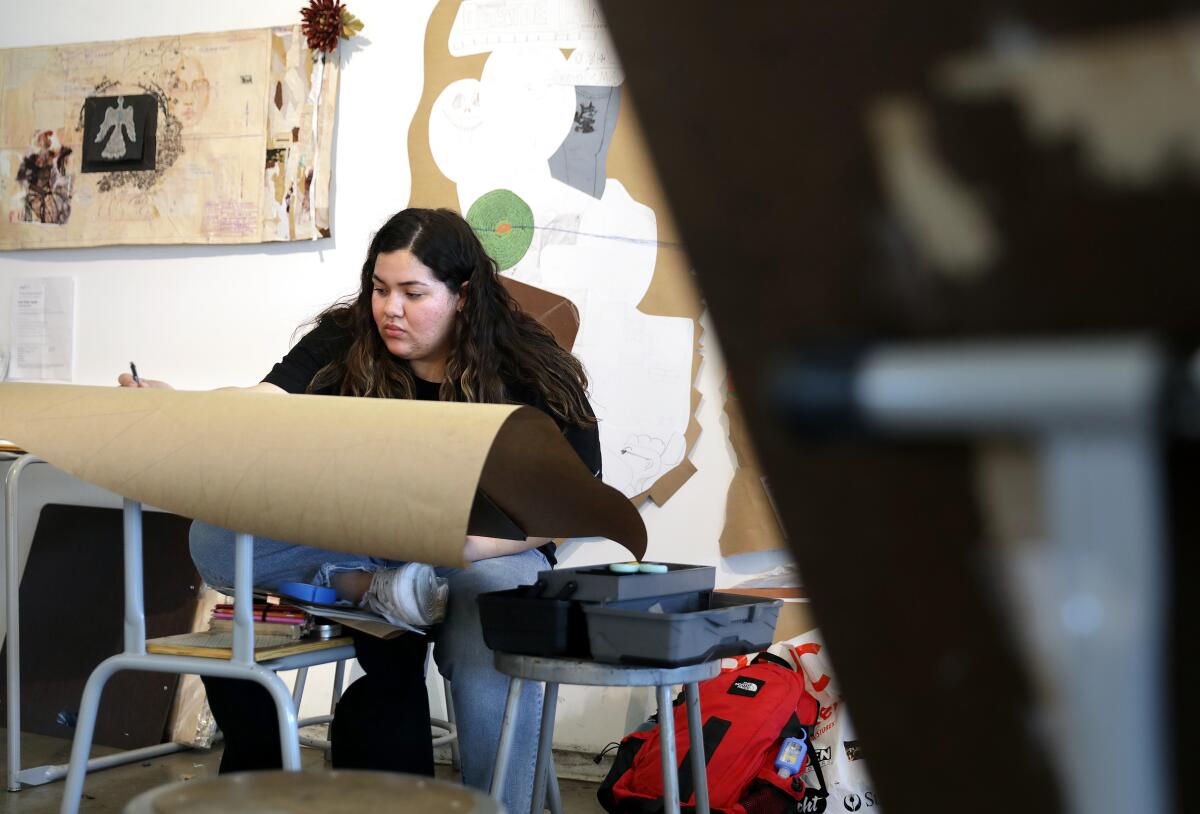
Antonia Sanchez is one student who has benefited from the campaign’s new scholarship funds. Sanchez, who grew up in Soledad, Calif., as the daughter of immigrant agricultural workers, received state and UC financial aid to cover her tuition but never realized that supplies needed for her art major would be so expensive. She said she would call her father in tears, apologizing for the expense, until UCLA awarded her a $1,500 Centennial Scholarship.
Touching such lives is why Pritzker, a Los Angeles billionaire and cofounder of a private equity firm, agreed to donate nearly $100 million to the campaign through his family foundation.
“Investing in UCLA is investing in California,” Pritzker said. “We’re giving these kids an opportunity they deserve at what is now the No. 1 public university in the country. That’s a pretty special thing.”
More to Read
Start your day right
Sign up for Essential California for news, features and recommendations from the L.A. Times and beyond in your inbox six days a week.
You may occasionally receive promotional content from the Los Angeles Times.
